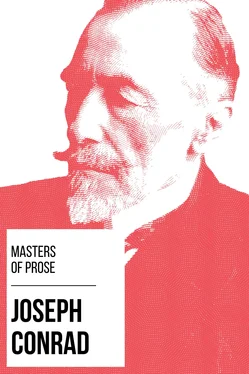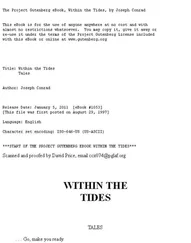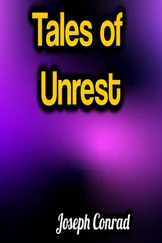Did I overhear a civil murmur, “That's very gratifying, to be sure?” Well, yes, it is gratifying—thank you. It is at least as gratifying to be certified sober as to be certified romantic, though such certificates would not qualify one for the secretaryship of a temperance association or for the post of official troubadour to some lordly democratic institution such as the London County Council, for instance. The above prosaic reflection is put down here only in order to prove the general sobriety of my judgment in mundane affairs. I make a point of it because a couple of years ago, a certain short story of mine being published in a French translation, a Parisian critic—I am almost certain it was M. Gustave Kahn in the “Gil Blas”—giving me a short notice, summed up his rapid impression of the writer's quality in the words un puissant reveur. So be it! Who could cavil at the words of a friendly reader? Yet perhaps not such an unconditional dreamer as all that. I will make bold to say that neither at sea nor ashore have I ever lost the sense of responsibility. There is more than one sort of intoxication. Even before the most seductive reveries I have remained mindful of that sobriety of interior life, that asceticism of sentiment, in which alone the naked form of truth, such as one conceives it, such as one feels it, can be rendered without shame. It is but a maudlin and indecent verity that comes out through the strength of wine. I have tried to be a sober worker all my life—all my two lives. I did so from taste, no doubt, having an instinctive horror of losing my sense of full self-possession, but also from artistic conviction. Yet there are so many pitfalls on each side of the true path that, having gone some way, and feeling a little battered and weary, as a middle-aged traveller will from the mere daily difficulties of the march, I ask myself whether I have kept always, always faithful to that sobriety where in there is power and truth and peace.
As to my sea sobriety, that is quite properly certified under the sign-manual of several trustworthy shipmasters of some standing in their time. I seem to hear your polite murmur that “Surely this might have been taken for granted.” Well, no. It might not have been. That August academical body, the Marine Department of the Board of Trade, takes nothing for granted in the granting of its learned degrees. By its regulations issued under the first Merchant Shipping Act, the very word sober must be written, or a whole sackful, a ton, a mountain of the most enthusiastic appreciation will avail you nothing. The door of the examination rooms shall remain closed to your tears and entreaties. The most fanatical advocate of temperance could not be more pitilessly fierce in his rectitude than the Marine Department of the Board of Trade. As I have been face to face at various times with all the examiners of the Port of London in my generation, there can be no doubt as to the force and the continuity of my abstemiousness. Three of them were examiners in seamanship, and it was my fate to be delivered into the hands of each of them at proper intervals of sea service. The first of all, tall, spare, with a perfectly white head and mustache, a quiet, kindly manner, and an air of benign intelligence, must, I am forced to conclude, have been unfavourably impressed by something in my appearance. His old, thin hands loosely clasped resting on his crossed legs, he began by an elementary question, in a mild voice, and went on, went on. . . . It lasted for hours, for hours. Had I been a strange microbe with potentialities of deadly mischief to the Merchant Service I could not have been submitted to a more microscopic examination. Greatly reassured by his apparent benevolence, I had been at first very alert in my answers. But at length the feeling of my brain getting addled crept upon me. And still the passionless process went on, with a sense of untold ages having been spent already on mere preliminaries. Then I got frightened. I was not frightened of being plucked; that eventuality did not even present itself to my mind. It was something much more serious and weird. “This ancient person,” I said to myself, terrified, “is so near his grave that he must have lost all notion of time. He is considering this examination in terms of eternity. It is all very well for him. His race is run. But I may find myself coming out of this room into the world of men a stranger, friendless, forgotten by my very landlady, even were I able after this endless experience to remember the way to my hired home.” This statement is not so much of a verbal exaggeration as may be supposed. Some very queer thoughts passed through my head while I was considering my answers; thoughts which had nothing to do with seamanship, nor yet with anything reasonable known to this earth. I verily believe that at times I was light-headed in a sort of languid way. At last there fell a silence, and that, too, seemed to last for ages, while, bending over his desk, the examiner wrote out my pass-slip slowly with a noiseless pen. He extended the scrap of paper to me without a word, inclined his white head gravely to my parting bow. . . .
When I got out of the room I felt limply flat, like a squeezed lemon, and the doorkeeper in his glass cage, where I stopped to get my hat and tip him a shilling, said:
“Well! I thought you were never coming out.”
“How long have I been in there?” I asked, faintly.
He pulled out his watch.
“He kept you, sir, just under three hours. I don't think this ever happened with any of the gentlemen before.”
It was only when I got out of the building that I began to walk on air. And the human animal being averse from change and timid before the unknown, I said to myself that I really would not mind being examined by the same man on a future occasion. But when the time of ordeal came round again the doorkeeper let me into another room, with the now familiar paraphernalia of models of ships and tackle, a board for signals on the wall, a big, long table covered with official forms and having an unrigged mast fixed to the edge. The solitary tenant was unknown to me by sight, though not by reputation, which was simply execrable. Short and sturdy, as far as I could judge, clad in an old brown morning-suit, he sat leaning on his elbow, his hand shading his eyes, and half averted from the chair I was to occupy on the other side of the table. He was motionless, mysterious, remote, enigmatical, with something mournful, too, in the pose, like that statue of Giugliano (I think) de Medici shading his face on the tomb by Michael Angelo, though, of course, he was far, far from being beautiful. He began by trying to make me talk nonsense. But I had been warned of that fiendish trait, and contradicted him with great assurance. After a while he left off. So far good. But his immobility, the thick elbow on the table, the abrupt, unhappy voice, the shaded and averted face grew more and more impressive. He kept inscrutably silent for a moment, and then, placing me in a ship of a certain size, at sea, under conditions of weather, season, locality, etc.—all very clear and precise—ordered me to execute a certain manoeuvre. Before I was half through with it he did some material damage to the ship. Directly I had grappled with the difficulty he caused another to present itself, and when that, too, was met he stuck another ship before me, creating a very dangerous situation. I felt slightly outraged by this ingenuity in piling trouble upon a man.
“I wouldn't have got into that mess,” I suggested, mildly. “I could have seen that ship before.”
He never stirred the least bit.
“No, you couldn't. The weather's thick.”
“Oh! I didn't know,” I apologized blankly.
I suppose that after all I managed to stave off the smash with sufficient approach to verisimilitude, and the ghastly business went on. You must understand that the scheme of the test he was applying to me was, I gathered, a homeward passage—the sort of passage I would not wish to my bitterest enemy. That imaginary ship seemed to labour under a most comprehensive curse. It's no use enlarging on these never-ending misfortunes; suffice it to say that long before the end I would have welcomed with gratitude an opportunity to exchange into the Flying Dutchman. Finally he shoved me into the North Sea (I suppose) and provided me with a lee shore with outlying sand-banks—the Dutch coast, presumably. Distance, eight miles. The evidence of such implacable animosity deprived me of speech for quite half a minute.
Читать дальше












